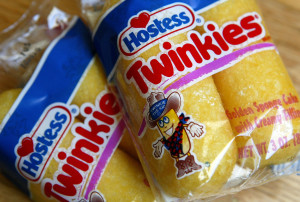Growing up, my twin brother was a big fan of Twinkies. Me, not so much. I could take them or leave them. I was always more a fan of sugar cereals. Cinnamon Toast Crunch was my favorite. As an adult, I like bananas. A lot. I eat one almost every day. It’s a good thing that bananas are good for runners. I also like apple juice, even more than bananas. “Apple juice” were my first words as a baby. Seriously. I said “apple juice” even before I said “mom” or “dad.” Unfortunately, apple juice is not as healthy as bananas unless the juice is unprocessed and comes straight from apples, but the sugar in apple juice provides my muscles with a quick source of energy to run.
People who want to lose weight always ask me how often they should run. I usually respond, “You only have to run on the days you eat.” (Not everyone gets my sense of humor.)
I admit I have always eaten what and how much I want, perhaps because I grew up with sugar cereals like Cinnamon Toast Crunch and Fruit Loops and perhaps because I know I’m going to run off any excess calories anyway. It doesn’t help that people are always giving me food, telling me, “You can afford to eat it. You’ll just run it off.” I have never tried or needed to lose weight. But I have also never gained weight, which underscores the importance of daily running for maintaining weight. I have been running six days per week since I was in sixth grade, including plenty of high-intensity interval training and races and, at age 43, my weight is exactly the same as it was when I was in high school. Seriously. Running is the best fat-burning torch there is. But running, despite its large calorie burn, is also not enough if I wanted to lose weight. And just because I run a lot doesn’t mean I should eat Fruit Loops.
What? Wait a minute! Did Dr. Jason just say that running won’t make you lose weight? No, I didn’t exactly say that. But there is a qualifier. Running by itself won’t make you lose weight. That’s because running is only half the equation when it comes to weight loss. Burning big-time calories isn’t enough to lose weight; you must also eat fewer calories during the day. Interestingly, research shows that exercise alone does not lead to weight loss. Empirical evidence supports that, too. With all of the gyms and personal trainers and fitness gadgets on the market, the rate of obesity is still rising. Many people exercise and still don’t lose weight. Why?
One of the reasons why running per se is not very effective to lose weight is because it takes a lot of running—and therefore a lot of effort and time—to accomplish the caloric deficit needed to lose a significant amount of weight. And, although more running burns more calories and enhances the metabolic profile of your muscles to shift metabolism toward a greater reliance on fat, your body is very smart—at high levels of physical activity, your body adjusts the number of calories it expends the rest of the day to keep your total daily caloric expenditure within a narrow range.
It is much easier, both theoretically and practically, to manipulate one’s diet and consume fewer calories. For example, to achieve a 300-calorie deficit, you can either run three miles or you can not eat a couple of ounces of potato chips. Which is easier to do? To drop pounds, people tend to stick with low-calorie diets more readily than they continue with exercise. Same is true for burning calories versus replacing them. It may take you about 30 minutes to run 3 miles and burn 300 calories, but it can take you just a few seconds to replace them (and then some) with a glass of Gatorade and a blueberry muffin.
No one really needs Gatorade anyway. Just like I don’t need Fruit Loops.


One Response to Twinkies, Apple Juice, and Weight Loss